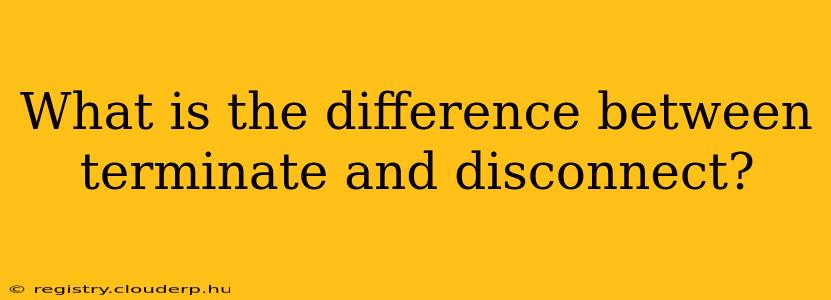What's the Difference Between Terminate and Disconnect? Unraveling the Nuances of Severing Connections
The words "terminate" and "disconnect" are often used interchangeably, especially in casual conversation. However, a closer look reveals subtle but significant differences in their meanings and implications, particularly in technical and formal contexts. Understanding these distinctions is crucial for clear communication and avoiding potential misunderstandings.
This article will delve into the nuances of "terminate" and "disconnect," exploring their applications in various contexts and providing clear examples to illustrate the differences.
What does "Disconnect" mean?
"Disconnect" generally implies a temporary or reversible separation. It suggests a break in connection that can be easily re-established. Think of it as a pause rather than a complete end. The focus is on the cessation of the connection itself, without necessarily implying any further action or consequence.
Examples:
- Technology: "Disconnect the internet cable to reboot the router." This implies a temporary interruption; the connection can be restored afterward.
- Relationships: "We disconnected for a while after the argument, but we eventually reconciled." Here, it describes a temporary break in communication or interaction.
- Physical objects: "Disconnect the hose from the faucet." This simply means separating two connected items.
What does "Terminate" mean?
"Terminate," on the other hand, implies a final and irreversible end. It suggests a conclusive action that brings something to a definite close. There is often a sense of finality and potentially more significant consequences associated with termination.
Examples:
- Employment: "The company terminated his contract due to poor performance." This indicates the permanent end of the employment relationship.
- Legal agreements: "The contract was terminated after a breach of agreement." This implies the formal and final end of the contract's validity.
- Technology: "Terminate the process to free up system resources." This often implies forcefully ending a program or process. While you can often restart it, it's not simply a pause – it's a deliberate halting.
Key Differences Summarized:
| Feature | Disconnect | Terminate |
|---|---|---|
| Nature | Temporary, reversible | Permanent, irreversible |
| Consequence | Usually minimal | Often significant consequences |
| Implication | Break in connection | Final and conclusive end |
| Tone | Neutral to slightly negative | More formal, often negative |
What is the difference between terminating a connection and disconnecting a connection?
This question highlights the core distinction. Disconnecting a connection is a simpler action, often easily reversed. Terminating a connection is a more formal and decisive act, often having lasting ramifications. For example, disconnecting from a Wi-Fi network is temporary; terminating a service contract implies a permanent cessation of service.
Can disconnecting something lead to its termination?
Yes, in certain circumstances, a disconnection could lead to termination. For example, repeatedly disconnecting from a service without valid reason might result in the service provider terminating the account.
Are there any situations where the terms are interchangeable?
While generally distinct, in some informal contexts, the words might be used interchangeably without causing significant confusion. However, in formal settings, particularly those involving legal or technical matters, using the correct term is crucial for clarity and accuracy.
In conclusion, while seemingly similar, "disconnect" and "terminate" carry distinct meanings and implications. Choosing the right word depends on the context and the intended level of finality. Understanding this subtle difference can enhance your communication and avoid potential misinterpretations.

